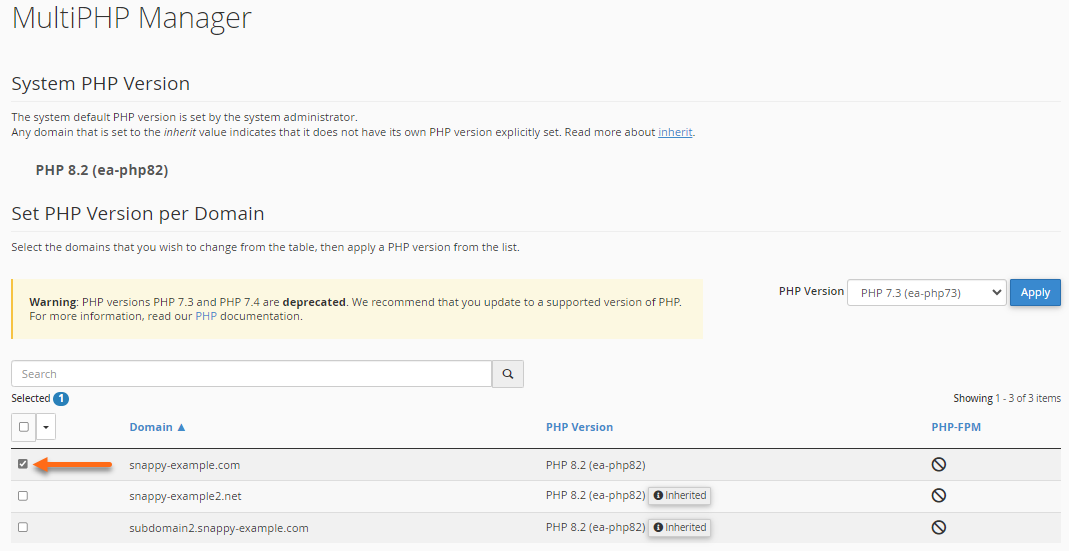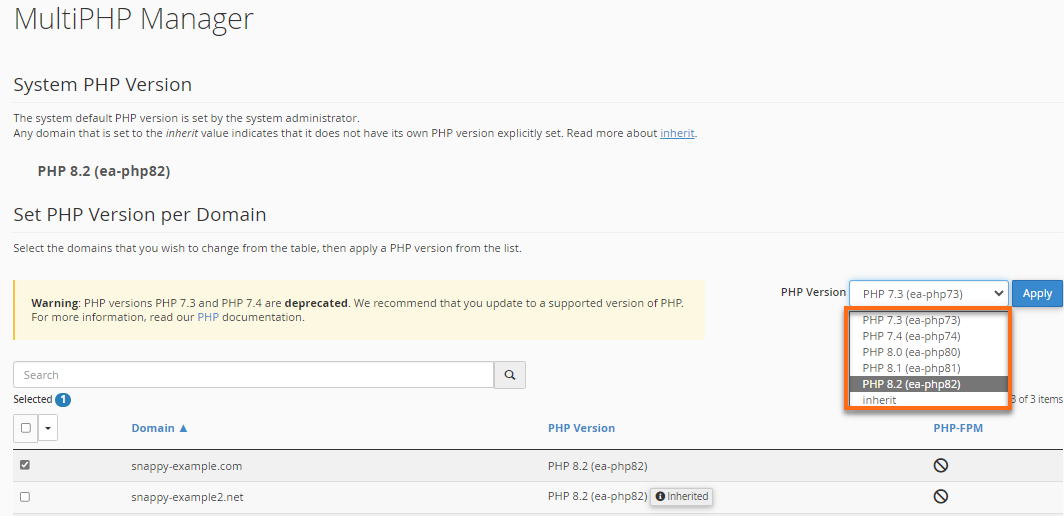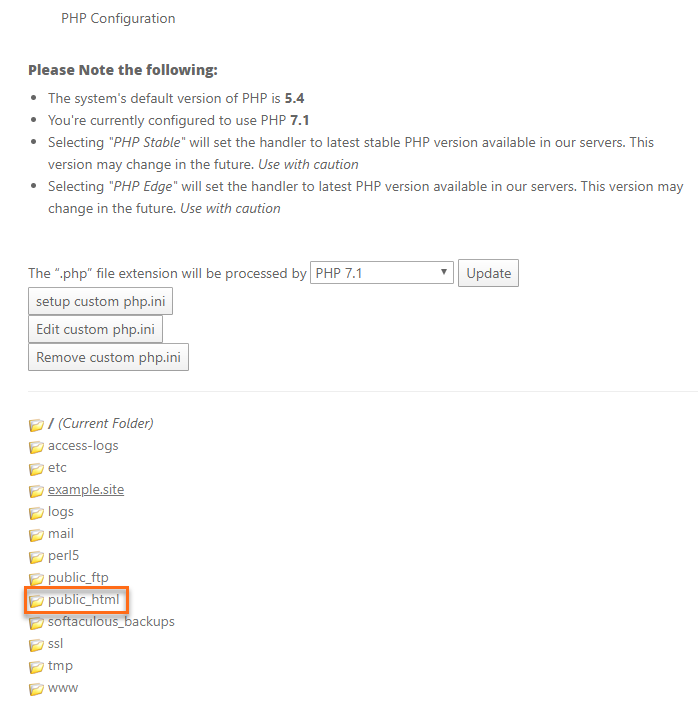How to Upload Php 7.2 to Hostgator Dedicated Server Using Command Line
How Practice I Update the PHP Version on my Site?
Suppose you lot always run into problems with the way your server handles PHP packages or observe WordPress requesting that you lot upgrade your PHP version. In that instance, it is helpful to know how to view and modify your server's PHP. Updating your site's PHP version is vital for the security of your website. Whenever a new PHP version is released, the latest security patches will exist implemented. This article discusses a few options on how to upgrade the PHP version in your hosting account.
What You Should Know
- Starting early March 2022, we volition exist upgrading the available PHP versions to include PHP 8.0 for Shared and Reseller hosting.
- As of August 2021, PHP 5.2 and 5.3 has been removed on Shared and Reseller hosting plans.
- Delight exist aware that PHP versions older than 7.3 will no longer be supported as we piece of work on upgrading accounts. If it is necessary for your website to utilise an older PHP version, this tin can exist done manually. Let us know via phone or Alive Chat then we tin can assist you. Even so, nosotros highly recommend that you upgrade all your website installations and applications to be compatible with the newest PHP version.
How Do I Upgrade My Site'due south PHP Version?
If your website needs a different PHP version, yous will want to log into your cPanel to manage the site's version.
Important Note
For our Optimized WordPress customers, put your listen at ease! HostGator'southward got your back in ensuring that your account is running the latest upward-to-engagement PHP version.
- There is no demand to downgrade PHP for a WordPress plugin or theme. Instead, it is best to upgrade your plugin or theme to work with the PHP version available in your Optimized WordPress accounts.
- If you need to change your PHP version, our support team will handle that for you lot. Just attain out to the states via phone or Live Conversation.
MultiPHP Director or PHP Selector
Depending on the version of cPanel you lot're using, yous volition employ either MultiPHP Director or PHP Selector to modify your PHP version. PHP Selector is being phased out, so information technology is most probable that you will apply MultiPHP Manager. To decide which one you have, you will need to:
- Log in to cPanel.
- Navigate to theSoftwaredepartment.

- If you lot see MultiPHP Director bachelor in your cPanel, you should follow the instructions for Selection i – MultiPHP Managing director below.

- If you nevertheless accept thePHP Selector in your cPanel, which many volition non, you tin follow the directions for Pick 2 – PHP Selector beneath.

- If you lot see MultiPHP Director bachelor in your cPanel, you should follow the instructions for Selection i – MultiPHP Managing director below.
Choice 1 - MultiPHP Director
Hither are the instructions outlined in the video above.
Curious as to what PHP version your website is using? A phpinfo file is what yous need. To find out how to create a phpinfo file, please visit this commodity, How to create a phpinfo.php file.
- Log in to cPanel.
- SelectMultiPHP Manager in the Software section.

- Select the domain you lot want to upgrade by checking the box on its left side.

- Choose your preferred PHP version from the dropdown, then click Utilize.

- There volition exist a pop-upward in the upper right corner, notifying you lot that the change was successful.

If you previously used thePHP Selector to modify your PHP version, there may be a handler in your .htaccess file that needs to be removed similar to this ane:
Use PHPedge equally default AddHandler application/x-httpd-php-border .php <IfModule mod_suphp.c> suPHP_ConfigPath /opt/phpedge/lib </IfModule> For specific instructions on how to prepare "Missing MySQL Extension" errors, please refer to our support article How to Set Mistake After MultiPHP upgrade.
Choice 2 - PHP Selector
This will be sunset, and few volition have information technology available.
The PHP Selector tin exist seen in some Shared servers. All the same, information technology may exist time to say good day to this feature very before long as you may not see the PHP Selector bachelor in your cPanel anymore. If you exercise withal happen to have the PHP Selector, click the expand below for the instructions.
The PHP Selector allows users on Shared and Reseller servers to easily enable a specific PHP version for a site.
To upgrade the PHP version of a site using the PHP Selector, please spotter this video.
Hither are the instructions outlined in the video above.
- Log into cPanel.
- In the Software department, click the PHP Selector icon.

- Navigate to the directory of the website you wish to upgrade the PHP. The document root for the principal site on your account is the public_html binder.

- From the dropdown menu, select the version of PHP you want to apply, and then click upgrade.

Caution: If your site's scripts rely on PHP'southward older functions, which are no longer available in the latest stable version being used on the server, you may see compatibility problems when the PHP is automatically upgraded.
When using PHP Selector, upgrades are applied recursively. This ways any upgrade you utilise to a directory will also utilise to all subdirectories unless you apply a unlike directive to one of those subdirectories. Therefore, to use a different PHP version for an addon domain, you would need to navigate the document root for the addon domain and select the advisable PHP version.
Demand a bit more than aid? Contact HostGator support via phone or Live Conversation, and we will be happy to assist you!
Source: https://www.hostgator.com/help/article/php-configuration-plugin
0 Response to "How to Upload Php 7.2 to Hostgator Dedicated Server Using Command Line"
Post a Comment